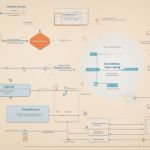Have you ever wondered how websites track and analyze user behavior?
Web Log Analyzer Log Correlation is the key to unlocking valuable insights from web server logs.
Explore the importance of web log analysis, the benefits it offers, and how it is used in cybersecurity, website optimization, and business analytics.
Discuss the challenges of log correlation and the best practices for choosing the right tools and implementing effective analysis strategies.
Dive into the world of web log analysis and uncover its potential for optimizing online performance.
What is Web Log Analyzer Log Correlation?
Web Log Analyzer Log Correlation refers to the process of analyzing and correlating data from web server logs to derive insights and patterns.
This process is crucial in data analysis as it allows organizations to gain a deeper understanding of user behavior, traffic sources, popular content, and potential security threats.
By examining log files, businesses can track user interactions, monitor site performance, and identify areas for improvement.
Log correlation helps in identifying trends in visitor demographics, such as geographic location and device preferences, which can be used to tailor marketing strategies and enhance user experience.
Analyzing log files also enables website owners to measure the effectiveness of their SEO efforts and make informed decisions to optimize their online presence.
Why is Web Log Analyzer Log Correlation Important?
Web Log Analyzer Log Correlation is crucial for organizations as it enables effective log management and monitoring.
By correlating log files from various sources, organizations can analyze patterns, detect anomalies, and identify potential security threats. This process plays a vital role in maintaining the integrity of log data, ensuring compliance with regulatory standards, and enhancing overall system performance.
Through log correlation, companies can streamline their data analysis processes, leading to quicker problem resolution, improved decision-making, and a more secure IT environment. Embracing Web Log Analyzer Log Correlation is not just advantageous but essential in today’s data-driven world.
What are the Benefits of Web Log Analyzer Log Correlation?
The benefits of Web Log Analyzer Log Correlation include enhanced log visualization, detailed log reporting, and identification of log patterns for deeper insights.
Through its robust capabilities, this tool enables users to transform complex log data into easy-to-understand visualizations, making it simpler to identify trends, anomalies, and potential issues within the system.
By generating comprehensive reports based on correlated log data, users can gain valuable insights into user behavior, website traffic patterns, and system performance, allowing for informed decision-making and proactive troubleshooting.
The ability to recognize recurring log patterns empowers users to predict future issues, optimize system efficiency, and enhance overall user experience.
How Does Web Log Analyzer Log Correlation Work?
Web Log Analyzer Log Correlation works by analyzing log metrics, interpreting log data, and detecting anomalies to uncover meaningful insights.
This process involves collecting log data from various sources, such as web servers, applications, and network devices, and then consolidating and correlating this data to identify patterns and trends. By examining the log information, analysts can gain a deeper understanding of user behavior, system performance, and security events.
This helps organizations make data-driven decisions, improve operational efficiency, and enhance security measures. Detecting anomalies in the log data is crucial as it can indicate potential security breaches, system failures, or irregular user activities that require immediate attention.
What Data is Analyzed in Web Log Analyzer Log Correlation?
Web Log Analyzer Log Correlation analyzes various data points, including traffic patterns, log alerts, and user interactions to extract meaningful information.
By delving into these different types of data, analysts can uncover key insights into user behavior, site performance, and potential security breaches. For instance, by studying traffic patterns, organizations can identify peak times of activity, popular pages, and areas for optimization. User interactions provide details on user engagement, preferences, and navigation trends, helping in enhancing user experience. Log alerts play a crucial role in highlighting potential errors, security threats, or abnormal activities that require immediate attention, ensuring the maintenance of a secure and efficient online environment.
What Tools are Used for Web Log Analyzer Log Correlation?
Various tools are employed for Web Log Analyzer Log Correlation, including log parsing utilities, log processing software, and tools for deriving log insights.
Log parsing plays a crucial role in extracting relevant information from raw log files by breaking down structured data into more manageable formats. Log parsing tools help in converting unstructured log data into a readable format, enabling easier analysis and monitoring of website traffic and user behavior.
Log processing methods, on the other hand, involve organizing and categorizing log data to identify patterns, anomalies, and trends. By using specialized software for log processing, businesses can uncover valuable insights that inform decision-making processes and improve overall system performance.
What are the Challenges of Web Log Analyzer Log Correlation?
Despite its benefits, Web Log Analyzer Log Correlation faces challenges such as identifying log trends, detecting abnormalities, and addressing log correlation complexities.
Recognizing log trends in Web Log Analyzer Log Correlation can be daunting due to the vast amount of data generated from various sources.
Handling log abnormalities presents another hurdle as it requires distinguishing between normal variations and potential issues that could impact the system.
Overcoming challenges related to log correlation processes involves implementing advanced algorithms and pattern recognition techniques to effectively connect the dots between different log files and extract meaningful insights for enhancing system performance and security measures.
How Can These Challenges be Overcome?
To tackle the challenges in Web Log Analyzer Log Correlation, organizations can leverage advanced techniques for correlating log events, analyzing log behavior, and implementing effective log correlation strategies.
By delving deeper into log behavior, companies can gain valuable insights into system performance, security threats, and user activities. Implementing log correlation techniques allows for the identification of patterns or anomalies that might go unnoticed when logs are analyzed in isolation.
Strengthening log event correlation processes enables organizations to detect and respond to incidents more proactively, reducing the impact of potential security breaches or system failures. Ultimately, understanding log behavior and enhancing log event correlation processes can significantly boost the effectiveness of Web Log Analyzer Log Correlation efforts.
What are the Common Uses of Web Log Analyzer Log Correlation?
Web Log Analyzer Log Correlation finds applications in various domains, using log correlation tools, platforms, and methodologies for different use cases.
By analyzing logs from web servers, applications, and network devices, log correlation tools help organizations identify security threats, troubleshoot system issues, and optimize performance. In cybersecurity, log correlation is crucial for detecting anomalies and potential breaches by correlating data from multiple sources. In IT operations, these tools provide valuable insights into system health, user behavior, and resource utilization.
Log correlation platforms like Splunk, ELK Stack, and Graylog are widely used for processing and analyzing log data in real-time, enabling organizations to make informed decisions and take proactive measures.
How is Web Log Analyzer Log Correlation Used in Cybersecurity?
In cybersecurity, Web Log Analyzer Log Correlation is employed with advanced log correlation engines, specialized software, and cutting-edge advancements to detect and respond to security threats effectively.
By utilizing log correlation engines, organizations can aggregate and analyze vast amounts of log data from various sources, such as network devices and application servers, to identify patterns and anomalies indicative of potential threats. These engines integrate with security information and event management (SIEM) systems to provide real-time monitoring and correlation capabilities, bolstering the overall cybersecurity posture.
Recent advancements in log correlation technology have enhanced the automation of threat detection and response, enabling rapid incident containment and mitigation of cyber risks.
How is Web Log Analyzer Log Correlation Used in Website Optimization?
Web Log Analyzer Log Correlation is instrumental in website optimization, employing effective log correlation strategies, specialized services, and futuristic approaches to enhance user experience and performance.
By analyzing log data from web servers, applications, and network devices, log correlation enables businesses to uncover valuable insights into user behavior, traffic patterns, and system performance. This data-driven approach helps identify areas for improvement, optimize content delivery, and enhance security measures. With the rising demand for personalized user experiences, the incorporation of machine learning algorithms in log correlation tools offers a forward-looking perspective on website optimization. Anticipated trends include real-time analytics, intelligent anomaly detection, and predictive maintenance, all geared towards transforming how websites operate in the digital landscape.
How is Web Log Analyzer Log Correlation Used in Business Analytics?
Business analytics benefit greatly from Web Log Analyzer Log Correlation, utilizing varied approaches, industry-specific benefits, and innovative log correlation techniques to derive actionable insights and drive informed decisions.
When businesses harness the power of Web Log Analyzer Log Correlation, they gain a deep understanding of user behavior, website traffic patterns, and system performance. This level of insight enables organizations to optimize their marketing strategies, enhance user experience, and troubleshoot technical issues promptly.
By integrating log correlation methodologies, companies across various sectors, such as e-commerce, digital marketing, and IT, can enhance their decision-making processes and streamline operations for greater efficiency and profitability.
What are the Best Practices for Web Log Analyzer Log Correlation?
Implementing best practices in Web Log Analyzer Log Correlation involves utilizing reliable solutions, conducting thorough tool comparisons, and staying informed about the latest trends in log correlation methodologies.
- By selecting suitable solutions for log correlation, organizations can streamline their analysis process and uncover critical insights from their vast amounts of log data.
- When comparing different log correlation tools, it is essential to consider factors such as scalability, ease of use, and compatibility with existing systems.
- Staying abreast of evolving trends in log correlation practices allows businesses to adapt to new technologies and methodologies, ensuring they remain at the forefront of efficient log analysis and detection of anomalies.
How to Choose the Right Web Log Analyzer Log Correlation Tool?
Selecting the appropriate Web Log Analyzer Log Correlation tool involves assessing available technologies, understanding specific use cases, and evaluating software features that align with organizational requirements.
By thoroughly evaluating the available technologies, one can pinpoint the tool that best matches the unique use cases within the organization. It is essential to match the capabilities of the software functionalities with the specific log correlation needs of the organization.
Understanding the nuances of how different tools handle log data and correlate information can greatly impact the efficiency and effectiveness of log analysis processes. By choosing a tool tailored to meet the organization’s log correlation needs, businesses can streamline their operations, enhance security measures, and gain valuable insights from log data.
What are the Steps for Effective Web Log Analyzer Log Correlation?
Achieving effective Web Log Analyzer Log Correlation involves recognizing the benefits it offers, aligning strategies with emerging trends, and understanding the importance of log correlation in data analysis.
By implementing a structured approach to log correlation, organizations can uncover valuable patterns and trends hidden within their vast log data. One critical step is to ensure proper data normalization to harmonize log entries from different sources for coherent analysis. Leveraging advanced analytics tools aids in automating the correlation process, enabling quicker identification of anomalies or security incidents. Incorporating machine learning algorithms can enhance predictive capabilities, allowing for proactive measures to be taken. This integration of cutting-edge technologies optimizes the efficiency of log correlation and empowers organizations to make data-driven decisions with confidence.






